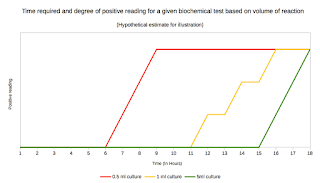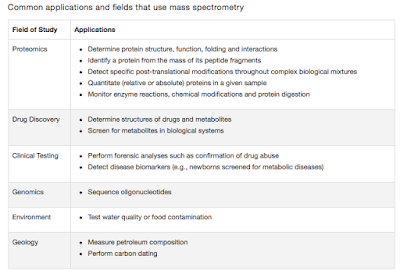Blogger's Desk #7: Guest post: Being a microbiologist: Roles and Responsibilities
Greetings,
I have had a great time being a blogger. Often at times I have received excellent questions and occasionally requests on topic that I might be willing to post about. More recently people have asked me if I could talk about what being a microbiologist actually means. There is actually not much posted about it in the blogosphere on this topic. Many aspiring microbiologists have no idea on what the subject is going to offer them. And there is a list of those who have the degree but has no idea why.
 So I requested Dr. Sridhar Rao, who blogs frequently and has a personal webpage that has a lot of microbiology in it. He had put it so neat, much better than I could dream of writing. Here is what he posted.
So I requested Dr. Sridhar Rao, who blogs frequently and has a personal webpage that has a lot of microbiology in it. He had put it so neat, much better than I could dream of writing. Here is what he posted.
------------------------------------------------------------------------------------
In the mid-nineties, people suggested that microbiology was a promising subject with good career prospects. A decade later, the same was said about bioinformatics and biotechnology. Sadly, none of them took off as expected. Not that people haven’t made good career out of these, but the sector itself failed to make any breakthrough. Microbiology is a vastly diverse field with multiple branches, medical microbiology being one of them.
What is medical microbiology?
It is a branch of microbiology that deals with the study of microbes that concerns human well-being. It involves the study of microbes that participate in human health and sickness. One has to understand the natural habitat of these organisms, their physiological properties, factors that make them pathogenic and the process by which they initiate infections. Understanding these is crucial to make the right diagnosis and therefore appropriate treatment as well as prevention.
Who should study it?
Since this branch of microbiology is “medical”, the subject is often taught in medical curriculum at both graduate and postgraduate levels. It is an integral part (along with immunology) in the second year of MBBS syllabus. Post graduate course in microbiology is offered in medical colleges as MD or M.Sc degree.
What is the scope of this subject?
Human ailments due to infectious diseases is a continuous concern, which requires participation by medical microbiologists. A qualified microbiologists has several roles to play in this filed.
a. As a consultant/specialist
Not all clinical conditions can be diagnosed accurately based on clinical presentations; the use of laboratory tests become crucial in many cases. The process begins with selection of appropriate laboratory test, which depends on several factors, such as the patient condition, age and the stage of illness. The physician and the microbiologists must consult each other before ordering a laboratory test. Ideally, a microbiologist must join the physician in the wards or be available on-call while seeking laboratory test. The channel of communication between the hospital and the laboratory must never break down; in many cases, the two behave as a disconnected islands. The physician must ensure that the requisition form is filled appropriately and sufficient information on the presumptive diagnosis, nature of clinical specimen and the timing of collection is communicated properly. The laboratory too must be able to reach out to the physician for additional information.
Microbiologist must inspect the quality of the specimen and must be able to reject them if they fail minimum standards. The laboratory must communicate with the patient as well as the physician citing reasons for rejection and advice on proper specimen collection. A microbiologist must hold one’s ground as there is no point performing a test on unsuitable specimen. It would serve no purpose! The report issued by the laboratory must be informative and must help the physician in selecting proper treatment. A comment from the microbiologist goes a long way in helping the physician interpret the report. The role of a microbiologist is not limited to reporting the requested test; if the microbiologist believes that certain additional tests may be performed to arrive at accurate diagnosis, the same must be communicated to the physician. Apart from suggesting appropriate antibiotic based on susceptibility test report, a microbiologist must participate actively in formulating hospital antibiotic usage/prescription policy.
b. As a scientist
Microbiology is a science; the skills and techniques must be honed repeatedly by participating in the bench work. Many believe that by obtaining the masters’ degree one reaches the pinnacle and therefore should quit bench work. In my opinion, this is regressive. There are technicians for the bench work, but whenever possible, one must take part in bench work to keep the skill intact or refine it. Science evolves only when people research. Newer discoveries help understanding the issues better. Newer techniques make the diagnostic processes quicker and efficient. A microbiologist must evolve along with the subject. One must keep pace with the newer concepts and technologies. A good microbiologist must observe patterns in the results and apply analytical mind. Whenever possible, the microbiologist must engage in research. If engagement in bench work is impossible, the person must be able to formulate research strategies, analyze results and publish findings. As a researcher, one must have basic knowledge of research methodology, including statistical analysis.
c. As a teacher
Once a person is deemed to be a professional microbiologist, it becomes his or her responsibility to train the subsequent generation. Knowledge must be disseminated. The microbiologist must be able to inspire new batch of students, make them understand and question the principles. The microbiologist must be able to pass on the skills to the students and help them become efficient. A microbiologist must be a role model for subsequent batch of students. With changing scenario, the microbiologist must be able to alter the pattern in teaching, which includes setting syllabus and evaluation of students.
d. As a student
Learning never ends; when working in a profession that continues to evolve, one must be up-to-date. As research is being conducted round the world and newer discoveries are made, every microbiologist must update oneself. Newer concepts on etiology, pathogenesis, diagnosis and treatment keep coming up and one must be aware of these. As a responsible microbiologist, one must make a habit of reading microbiology journals and participate in continuing medical education programs as often as possible. It is never too late to learn something new; one must grab any opportunity to attend workshops and acquire new skills.
e. Others
Apart from the roles mentioned above, a microbiologist can have additional responsibilities. A microbiologist is an integral member of infection control committee in hospital. As a part of the team, a microbiologist must be able to identify or track potential sources of infections and suggest ways and means to prevent nosocomial infections. In the laboratory, a microbiologist must be able to come up with Standard Operating Procedures (SOP) for all procedures performed. At the same time, the microbiologist must also be a quality control officer, and be able to monitor and ensure the quality of laboratory tests. A microbiologist can also play a vital role in designing laboratory and management of laboratory and wastes. Microbiologist must also participate in patient/community education programme through various interactions schemes. One can write manuals, textbooks, or even blogs to disseminate the knowledge to the masses. A microbiologist can interact with government and help in identification of deficiencies and formulations of new regulations. As an active member, one must participate in debates and deliberations of regional as well as national level associations of microbiologist at conferences.
Although possibilities are many, often opportunities are few. Yet, one must make honest attempts to expand the roles a microbiologist can have.
Sridhar Rao...





Comments
Post a Comment